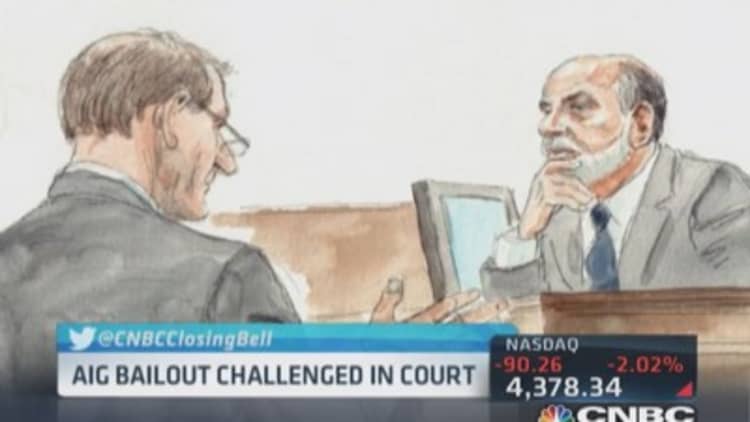He may have been a reluctant witness, but former Federal Reserve Chairman Ben Bernanke delivered powerful testimony during the 10th day of the AIG bailout trial.
On the stand Friday, Bernanke abandoned the cool demeanor with which he answered questions from the plaintiffs' attorney on Thursday. Bernanke was speaking so fast at one point when describing the causes of the financial crisis, the court stenographer asked him to slow down.
"I don't think I can," he said to laughter in the courtroom. "I was just trying to be efficient."
In the cross by Justice Department attorney Kenneth Dintzer, Bernanke painted a picture of the AIG bailout that suggests it was unique from other loans and rescue plans put together by the government during the financial crisis in 2008.
Read More Bernanke defends AIG bailout in court
This could prove key in the case (Starr International Co. v. U.S), which claims the government violated AIG shareholders Fifth Amendment rights by charging unusually high interest rates on loans that were part of a $185 billion dollar bailout, and by failing to compensate them properly for a 92 percent stake in the insurance giant the government took as part of the deal.
The plaintiffs argue other firms that received government aid did not have to give up equity and received loans that carried much lower rates.
Bernanke testified AIG was only one of five firms to receive 13-3 loans from the central bank. These are emergency loans the Fed is allowed to give during times of extreme financial distress, as long as they meet certain criteria.
In his testimony, Bernanke said he distinguished the loans to these five firms from broader programs the Fed initiated in 2008 like the Primary Dealers Credit Facility. These broad-based programs were available to a wider number of companies, many of whom were operating in a healthy manner. The programs' primary functions were to inject liquidity back into the financial system.
Judge Thomas C. Wheeler asked Bernanke to name the five firms receiving the emergency loans, and he listed Bear Stearns, AIG, the GSEs Fannie Mae and Freddie Mac (as one), Citigroup and Bank of America.
Read More AIG bailout trial may be good therapy!
Bernanke went on to say of these five loans or credit facilities set up as a 13-3 loan, the only ones that were drawn down were the ones for Bear Stearns and AIG.

He also said AIG received special treatment when it came to the collateral it pledged in exchange for the loans, bypassing a requirement of a 13-3 loans to post "good collateral" that must be separate from the firm itself.
"AIG was the only one of the two where this did not apply," said Bernanke, referring to AIG's insurance subsidiaries that were posted as collateral and held in special purpose vehicles, Maiden Lane II and Maiden Lane III.
"If the firm collapses, the collateral collapses," Bernanke said. "You can only conclude it was a risky loan."
Plaintiffs' attorney David Boies pushed back on this interpretation during redirect, noting that many of the marketable securities offered by other firms as collateral were not really marketable at the time, because the markets for these securities were barely trading.
Read MoreSix years after AIG bailout...was it legal?
Still, Bernanke's testimony showed the Fed was wading into new, and unfamiliar territory lending to an insurance company. The Fed had refused similar requests for these emergency loans from the automakers. Yet, Bernanke said given AIG was systemically important to the financial system, which it was trying to stabilize, the central bank agreed to the loan, though only as a lender of last resort.
"We very, very much did not want to make the loan," he said. "We had little information the loan would be effective."
As the former head of what is considered an independent entity, Bernanke did indicate the court of public opinion was on his mind when the Fed ultimately agreed to the loan.
Bernanke said he was concerned about an angry American public that would ask why save AIG when so many other companies were failing.
"I think there are limits to which appointed officials can deviate from the (public's) political will," he said.


